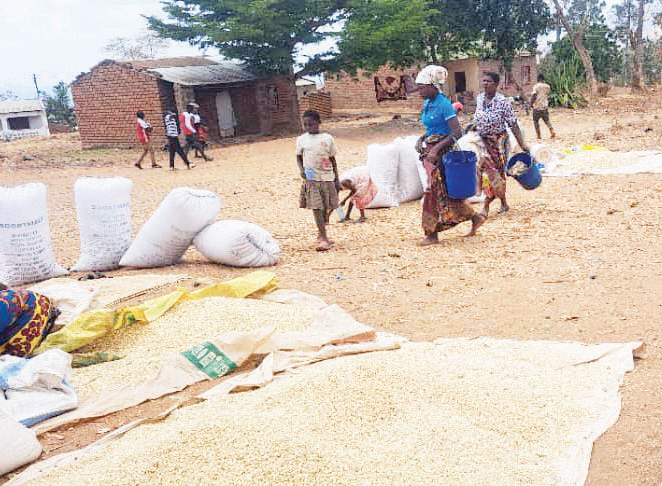Copyright times

As the first light of dawn spills across the cracked concrete pavements of Lilongwe’s Kanengo Industrial Area, 44-year-old Enoch Banda quietly joins the slow procession of workers heading toward the factory gates. His faded satchel, swinging from a weary shoulder, carries more than a lunchbox; it carries the silent burden of a man cornered by a collapsing economy. It is payday. But there’s no relief in his stride, no spark in his eyes. “I used to feel proud,” Enoch says. “Now, I feel like I’m just working to stay broke.” A father of four, Enoch earns K250,000 a month on paper, but by the time statutory deductions shave it down to K200,000, the salary barely lasts a day. He stays in Kauma Township, several kilometres from his workplace, but commuting is a luxury he cannot afford. Instead, he walks. Lunches alone cost him K40,000 monthly, cutting his usable income to K160,000. Rent K50,000. A 50-kilogramme bag of maize, the country’s staple food, now sells at around K70,000. “By the time I buy food, pay rent and get charcoal to cook, I’m already in debt,” he says. “I can’t even afford a bottle of beer. And that’s the least of my worries.” A small pack of charcoal, enough for a day’s cooking, now costs K1,500. Multiply that by 30 days, and you’re looking at K45,000—more than 20 percent of his net salary, just to prepare food he often cannot afford. The numbers simply do not add up. And, yet, Enoch is among the ‘fortunate’ ones; those with jobs. Across town in Bwalo la Njobvu, 29-year-old Mike earns K150,000 working as a shop attendant. His struggle is no different; only steeper. Like millions of other Malawians, Mike is trapped in a daily grind that offers no reward, no upward path and no escape. “I don’t live anymore,” he says. “I survive. Barely.” The Centre for Social Concern (CfSC) reports that a family of six in Malawi’s major cities now needs approximately K910,000 per month to meet basic needs. Yet, the average monthly income remains stuck around K200,000. That means most families fall short by over K700,000 every single month. From crisis to collapse Malawi’s cost of living has soared over the past five years, with prices of basic commodities such as food, rent, fuel, soap climbing five to tenfold. Meanwhile, incomes have stagnated. Jobs are scarce. Opportunities, scarcer still. The previous Malawi Congress Party-led government, ousted in September 2025, blamed global crises such as Covid, the Russia- Ukraine war, and climate shocks for the economic decline. But for the average Malawian, these explanations do little to explain why their pay cannot even cover a bag of maize. In its Malawi Country Economic Memorandum, the World Bank notes that only one in 10 Malawians over the age of 15 has a wage or salary paying job. That is to say nine in every 10 Malawians do not have a wage or salary paying job. In its August 2025 Basic Needs Basket, the Centre for Social Concern notes that low-income households, who form the majority of urban dwellers in Malawi, are disproportionately affected by increases in cost of living According to CfSC, many households survive on incomes far below the national poverty line of $3.00/day (approximately K5, 250 at current exchange rates). The welfare monitoring body says, with the cost of living now standing at over K910, 000 per month, the gap between incomes and expenses continues to widen. CfSC says the immediate consequences include food insecurity, erosion of household dignity and the adoption of coping mechanism “Families are being forced to cut down on meal frequency and dietary diversity, compromising nutrition, especially for children and pregnant women “Even basic hygiene products such as soap and body lotion are becoming unaffordable, lowering living standards “Households are resorting to borrowing, withdrawing children from school, or engaging in unsustainable activities such as charcoal burning, which has long-term environmental consequences,” CfSC says The welfare monitoring body believes that the current cost of living crisis requires urgent and multi-pronged government action Among the short-term measures, CfSC urges the government to stabilise maize prices by strengthening Agricultural Development and Marketing Corporation’s presence in local markets to counter speculative pricing It also proposes the expansion of social protection, including cash transfers and food aid, targeting vulnerable groups in both rural and urban areas Further, CfSC urges enforcement of fair trade practices, monitoring price manipulation in urban markets In the medium term, the welfare monitoring body proposes investing in irrigation and climate-smart agriculture to reduce reliance on rain-fed production and stabilise the supply of vegetables, legumes and maize throughout the year “Support smallholder farmers’ cooperatives with market access and storage facilities to reduce postharvest losses and stabilise supply. ‘Encourage urban agriculture initiatives to improve access to fresh foods for city residents. Improve energy alternatives, making cooking gas and electricity more affordable to reduce reliance on charcoal and relieve household expenditure,” the centre says. Economist Marvin Banda says because the millionaire status is a prerequisite for survival in Malawi in order to feed a family of six, it is a daunting task for many consumers to fulfill, especially considering that the income gap is extremely unfavourable for many Malawians. He adds that with the approaching lean season, massive humanitarian assistance will be required He says the saving grace for many comes from the fact that the economy is largely informal and that this allows for certain structural rigidities to be overcome “Indeed, Calvo-pricing indicates that wages and salaries are some of the stickiest economic indicators, which only means that as prices continue to increase, the expectation is that salaries will not increase in proportion to these price increases, which is why the informal economy is important as it serves as a tax haven for the struggling Malawian “Most low-income households are unburdened by income tax due to their nature of employment and levels of income, which helps preserve precious purchasing power “Other consumers are reliant on their families, both in Malawi and abroad, who remit portions of their income and the unfair ratio of 1:9 is incredibly burdensome for many. The performance of remittances has been underscored during the past five years as it has been a source of both income and forex,” he says Banda hopes that productivity will restore confidence. “However, the agricultural sector remains the most viable source for employment and capitalisation “Along with value-added interventions that aim to penetrate the global value chain to provide solace for many [people] in the economy, the sector has the potential of increasing domestic revenues for governments through the multiple tier approach that will see tax-to- GDP [gross domestic product] ratio increase,” Banda say Another economist Velli Nyirongo believes many Malawian low earners are surviving through great resilience and creativity, often relying on informal economic activities to make ends meet He notes that with the high cost of living in cities such as Blantyre, Lilongwe, Mzuzu and Zomba, where a family of six now requires about K910,000 a month to survive, yet the average salary remains around K200,000, it is evident that formal employment alone is not enough to sustain most households “Many Malawians are, therefore, turning to the informal sector, engaging in small-scale businesses such as street vending, subsistence farming and casual labour to supplement their income “However, the challenge is that these informal activities often do not generate sufficient income to cover essential needs and, as a result, some individuals may be tempted to resort to illegal practices such as petty corruption or other unethical means simply to survive,” Nyirongo say To improve the situation, Nyirongo argues that it is crucial to address the underlying economic pressures One practical solution, according to Nyirongo, would be to reduce urbanisation by developing satellite cities and towns, where the cost of living, particularly for housing, is lower, thereby easing the strain on major urban centres This, he says, would create more balanced economic opportunities across the country and discourage excessive migration to already overburdened cities. “In addition, the government should focus on reducing the cost of living by tackling inflation and increasing the production of essential goods such as food. “Strengthening agricultural output, supporting local industries and improving access to affordable bas ic commodities would significantly enhance the livelihoods of low earners,” he says. “Ultimately, a combination of strategic urban planning, economic reform and investment in productive sectors would help Malawians live with greater dignity and stability,” Nyirongo adds. Like millions of Malawians, Enoch survives. Not through government aid, not through salary growth, but through grit, sacrifice and the thin thread of hope that tomorrow will not be worse than today. How families are surviving remains a mystery. But what is certain is this: In Malawi, survival is no longer about living; it is about endurance.



